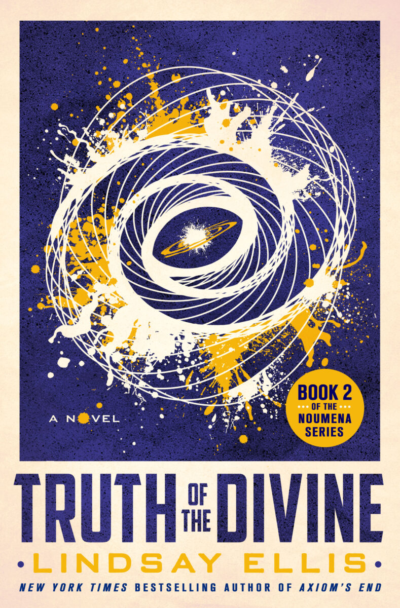Truth of the Divine – Lindsay Ellis

Truth of the Divine is the second book in the series called Noumena by Lindsay Ellis. The first book (Axiom’s End) is a first contact novel, about aliens coming to earth and the relationship being formed between one alien and Cora, a 20-something college dropout. That book was totally OK, although my main criticism about that one is that it read more like an young adult book, and I might have had a hard time totally connecting with the main character.
I’m not going to go into the first book much more than that. If you haven’t read that one there’s no need to read about the second book in the series, as they are very much connected and you really should start with the first one. So spoilers ahead for the first book from now on.
In this book, we continue to follow Cora as she works for a government agency functioning as the translator between the alien Ampersand and the government. Ampersand is not the most talkative or cooperative of creatures, very much to the frustration of the agency. The main debate in this story is how the agency are going to break the news to the people of the US, and to the whole world, that aliens are among us and that we have established connection with them. With that also comes the discussion about what rights to extend to these creatures, a theme that is a big part of the tension in this book.
On top of this, a second alien connected to Ampersand lands on earth, and in the search for this alien Cora runs into the journalist Kaveh and together they have to deal with the aliens and how to communicate their existence to the public.
There are a few themes the author puts the focus on in this book. The main one is the connection between Cora and Ampersand, which was established in the first book and continues to be deepened in this one, but also that between Cora and Kaveh. The second one is the political theme about the people in the US being divided in the discussion of what rights to extend to the aliens and if they should be viewed as humans with the same rights as us.
The relationships between the characters is the theme that takes up the most part, so one should not expect any hard sci-fi when picking up this book. There is some bigger questions about the future of humanity being brought up, but this does not get much attention in the story. Cora has some PTSD-issues stemming from what happened in the first book, and a large part of the book is both Ampersand and Kaveh in turns trying to help Cora cope with her psychological problems. This is, what I can tell, a well written description of what a person in her position is going through, and also a well written description of how it might effect the people around.
The problem I see in the novel is that some parts of it looses tempo quite much, some parts could have been somewhat shorten. I don’t think that would have affected the main storytelling too much, and could have given some other themes some room to breath. It does pick up in the later half, and much comparisons can be made between the political landscape of today and the one in the book. I’m sure the author has taken much inspiration from the current political climate.
In conclusion, it’s well written and quite probable tale about how first contact could go down if it were to happen. More than that it’s a deep dive into the psychological state of the main characters. This is good, but might be hard to relate to if you haven’t come in contact with those kind of issues, either yourself or someone close to you.
I gave this a 4 out of 5 on Goodreads.
